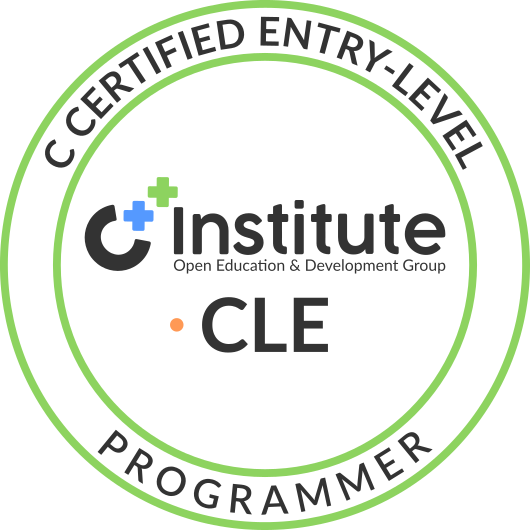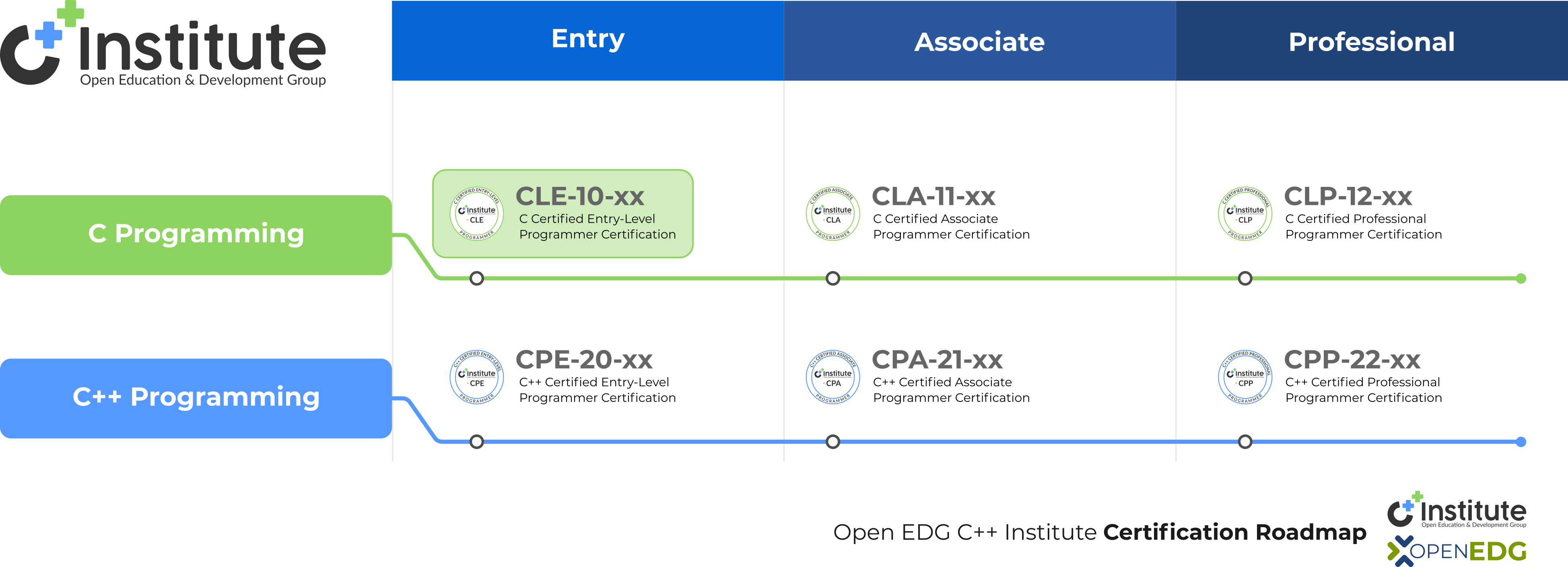The CLE – C Certified Entry-Level Programmer certification is the ideal starting point for individuals beginning their journey in software development, C programming, and related fields such as low-level and middle-level programming. It validates your understanding of core programming principles using the C language and sets the foundation for further growth, including progression to the CLA – C Certified Associate Programmer certification.
By earning the CLE certification, you demonstrate your ability to work with essential coding constructs, build simple yet functional C programs, and apply key problem-solving techniques. This credential helps you stand out in a competitive job market and opens the door to a wide range of technical career paths.

To earn the CLE – C Certified Entry-Level Programmer certification, a candidate should demonstrate the ability to apply basic programming concepts and write foundational C programs. Key knowledge areas and skills include:

Exam name:
CLE – C Certified Entry-Level Programmer
Exam code:
CLE-10-0x (x denotes the exam version)
Associated certifications:
CLA – C Certified Associate Programmer
CLP – C Certified Professional Programmer
Prerequisites:
None
Exam version:
CLE-10-01 (Active)
Duration:
45 minutes (exam) + approx. 5 minutes (Non-Disclosure Agreement/Tutorial)
Number of questions:
30
Format:
Single-choice questions, multiple-choice questions, gap fill, drag & drop
Passing score:
70%
Cost:
USD 69 (Exam)
USD 86 (Exam + Retake)
Languages:
English
Courses aligned:
C Essentials 1 – Cisco Networking Academy (Go to Cisco NetAcad)
C Essentials 1 (CE1) – OpenEDG Learning Platform (Go to OpenEDG Edube)
Exam delivery channel:
Exam policies:
Click here to view Exam Policies
Exam syllabus:
Click here to go to Exam Syllabus
Exam Vouchers
Exam vouchers available through the OpenEDG Voucher Store
The CLE certification exam evaluates foundational knowledge of the C programming language. It confirms the candidate's ability to write and analyze simple C programs, apply core programming constructs, and understand essential concepts such as compilation, variables, data types, operators, control flow, arrays, pointers, functions, and strings.
The CLE exam consists of 30 questions (items), each assigned a different point value depending on its complexity and learning objective. The maximum score is 30 points, which is normalized and converted into a percentage. To pass, a candidate must achieve a cumulative score of 70% or higher. The final result is based on total points earned across all items – not an average per exam block.
Block 1 – Basic Concepts
(Exam items: 4 | Weight: 13.25%)
Block 2 – Data Types, Evaluations, and Basic I/O Operations
(Exam items: 4 | Weight: 13.25%)
Block 3 – Arithmetic, Logical, and Bitwise Operators
(Exam items: 4 | Weight: 13.25%)
Block 4 – Flow Control: Decision-Making Statements
(Exam items: 4 | Weight: 13.25%)
Block 5 – Flow Control: Loops
(Exam items: 5 | Weight: 16.50%)
Block 6 – Arrays, Pointers, and Memory Management
(Exam items: 5 | Weight: 16.50%)
Block 7 – String Manipulation
(Exam items: 2 | Weight: 7%)
Block 8 – The Basics of Functions
(Exam items: 2 | Weight: 7%)
A Minimally Qualified Candidate (MQC) for the CLE – C Certified Entry-Level Programmer certification demonstrates basic proficiency in C programming. They are capable of writing and debugging simple programs using core language constructs and standard functions.
The MQC understands fundamental programming concepts and tools, including syntax, data types, literals, and operators (Block 1 & 2), and is able to control program flow using conditions and loops (Blocks 3–5). They can manipulate arrays, work with pointers and memory management (Block 6), and perform essential string operations (Block 7). The candidate also shows competence in writing functions and organizing code logically (Block 8).
The CLE credential confirms readiness for more advanced programming challenges and progression to the CLA certification.
Last updated: July 24, 2025
First published: November 15, 2012
Aligned with Exam CLE-10-01